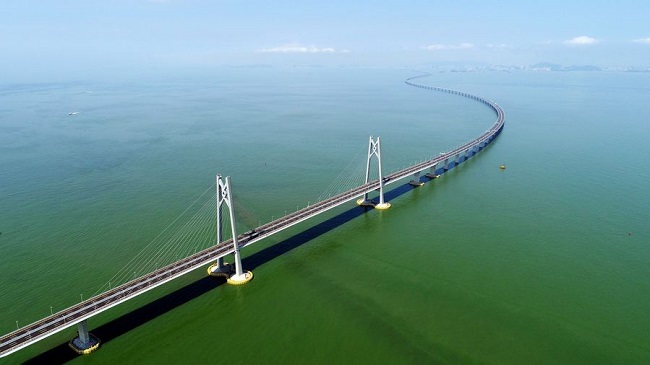Shenzhen set to lead reform and development in Greater Bay Area

Aerial photo taken on July 11, 2018 shows the Hong Kong-Zhuhai-Macao Bridge in South China. [Photo/Xinhua]
In a speech marking the 40th anniversary of the Shenzhen Special Economic Zone on Wednesday, President Xi Jinping highlighted the miracle of Shenzhen, and reiterated China's commitment to forging ahead with higher-level reform and opening-up. He also emphasized the importance of building the Guangdong-Hong Kong-Macao Greater Bay Area to implement the new development philosophy.
The 13th Five-Year Plan period (2016-20) saw remarkable achievements being made in the building of the Greater Bay Area, which has become an important growth pole for the national economy even in the new era.
Guangdong province, and the Hong Kong and Macao special administrative regions have established a smooth coordination mechanism for the construction of the Greater Bay Area, which will remove the systemic and institutional hurdles that impede development and facilitate the flow of people, capital, products, services and information. The designated area has made innovations in trade and investment, and the financial sector, which will help create a high-quality opening-up hub and serve as a comprehensive high-standard pilot free trade zone.
The Greater Bay Area will transform into a more open and transparent market, creating a more stable world-class business environment and enhance the region's global resource distribution capacity.
Guangdong, Hong Kong and Macao have talents with high innovation capabilities that can help develop the Greater Bay Area into a new global high-tech, innovation hub. The three places have already built an innovation and start-up environment, and established an innovation-led economic belt with industrial linkages. As a key project, the Guangzhou-Shenzhen-Hong Kong-Macao Technological Innovation Corridor explores international and domestic innovation resources to help enhance the region's independent innovation capacity and put technological achievements into commercial use.
The region as a whole has participated in the construction of the Belt and Road Initiative. And Guangdong, by using its advantage as a pivot, strategic, trade center of the Belt and Road, and Hong Kong and Macao, by becoming important nodes of the Belt and Road, have established a new cooperation mechanism to propel the initiative.
With the opening of the Hong Kong-Zhuhai-Macao Bridge, the rail network of the Greater Bay Area will facilitate a freer flow of production factors, enhance the region's global competitive edge in finance, trade and shipping, and act as an engine of the Belt and Road Initiative.
Yet the Greater Bay Area cannot be built without the support of the central government and joint efforts of people of Guangdong, Hong Kong and Macao. As a significant innovative project that enriches the practice of "one country, two systems", the Greater Bay Area will contribute to the common welfare of the residents of Guangdong and the two SARs.
The building of Shenzhen into a pilot zone for socialism with Chinese characteristics (2020-25) to facilitate higher-level reform and opening-up, which is closely connected with the Planning Outline of Guangdong-Hong Kong-Macao Greater Bay Area Development launched last year, comprises the blueprint for the Greater Bay Area.
So, during the 14th Five-Year Plan (2021-25) period, the development of the Greater Bay Area should focus on three major aspects.
First, it should focus on further opening-up. The area has multiple advantages to optimize production, distribution, and consumption systems, strengthen economic links between China and the rest of the world, promote the "dual circulation" development pattern, and help build a higher-level open economy.
Second, it needs to follow a people-oriented development strategy. The special economic zones were established, and the Greater Bay Area is being built, to fulfill people's aspiration of a beautiful life. Therefore, top priority should be given to improving the quality of life and sense of happiness of the people in the region by focusing on fields related to people's livelihoods.
And third, there is a need to instill a sense of community among the residents of Guangdong, Hong Kong and Macao, so that in the long run they, especially the youths in the two SARS, associate themselves with the overall development of the nation.


